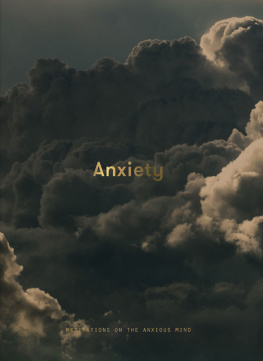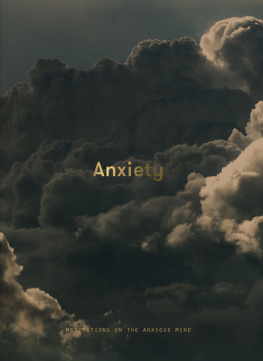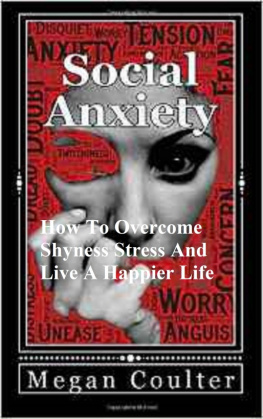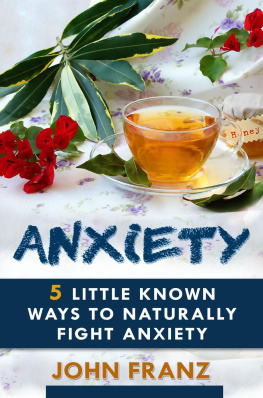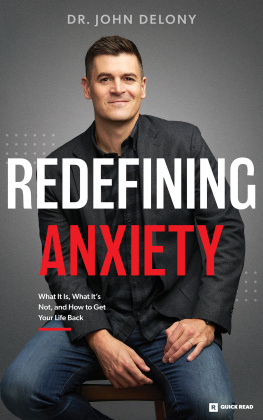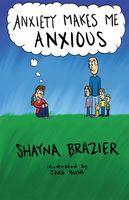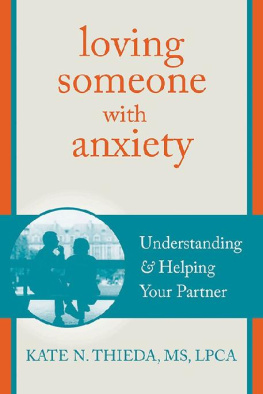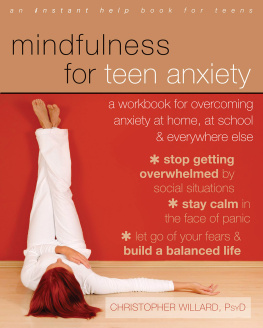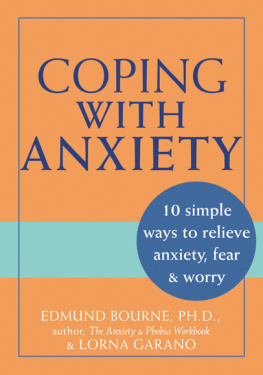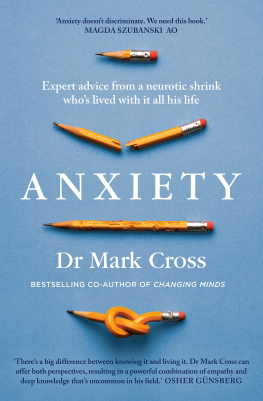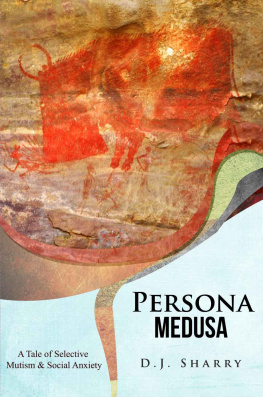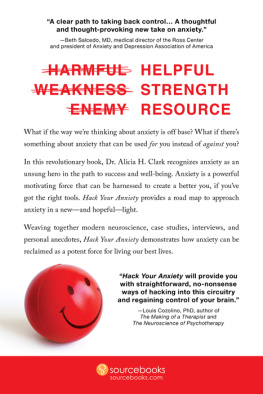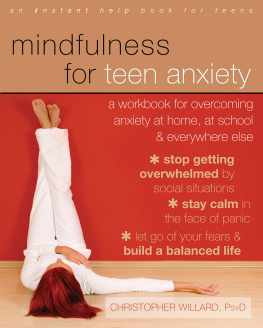The School Of Life. - Anxiety
Here you can read online The School Of Life. - Anxiety full text of the book (entire story) in english for free. Download pdf and epub, get meaning, cover and reviews about this ebook. year: 2020, publisher: School of Life Press, genre: Home and family. Description of the work, (preface) as well as reviews are available. Best literature library LitArk.com created for fans of good reading and offers a wide selection of genres:
Romance novel
Science fiction
Adventure
Detective
Science
History
Home and family
Prose
Art
Politics
Computer
Non-fiction
Religion
Business
Children
Humor
Choose a favorite category and find really read worthwhile books. Enjoy immersion in the world of imagination, feel the emotions of the characters or learn something new for yourself, make an fascinating discovery.
- Book:Anxiety
- Author:
- Publisher:School of Life Press
- Genre:
- Year:2020
- Rating:3 / 5
- Favourites:Add to favourites
- Your mark:
- 60
- 1
- 2
- 3
- 4
- 5
Anxiety: summary, description and annotation
We offer to read an annotation, description, summary or preface (depends on what the author of the book "Anxiety" wrote himself). If you haven't found the necessary information about the book — write in the comments, we will try to find it.
Anxiety — read online for free the complete book (whole text) full work
Below is the text of the book, divided by pages. System saving the place of the last page read, allows you to conveniently read the book "Anxiety" online for free, without having to search again every time where you left off. Put a bookmark, and you can go to the page where you finished reading at any time.
Font size:
Interval:
Bookmark:
ANXIETY
Published in 2020 by The School of Life
First published in the USA in 2020
Published in this ebook edition in 2020
70 Marchmont Street, London, WC1N 1AB
Copyright The School of Life 2020
All rights reserved. This book is sold subject to the condition that it shall not be resold, lent, hired out or otherwise circulated without the express prior consent of the publisher.
A proportion of this book has appeared online at
www.theschooloflife.com/thebookoflife
Every effort has been made to contact the copyright holders of the material reproduced in this book. If any have been inadvertently overlooked, the publisher will be pleased to make restitution at the earliest opportunity.
The School of Life is a resource for helping us understand ourselves, for improving our relationships, our careers and our social lives as well as for helping us find calm and get more out of our leisure hours. We do this through creating films, workshops, books and gifts.
www.theschooloflife.com
Ebook edition April 2020
ISBN 978-1-912891-21-4
10 9 8 7 6 5 4 3 2 1
INTRODUCTION
HOW COULD WE BE ANYTHING BUT?
It is, in a sense, astonishing that we ever manage to be anything but very concerned.
There is so much to which we are exposed, so many serious and unpredictable risks permanently waiting to threaten our peace of mind.
We live on a crowded planet, bathed in an atmosphere of dread, frenzy and ambition, and are forced to navigate around our vast technology-filled cities with a biological makeup better suited to a simpler, quieter, less excitable life in the savannah.
We dwell within painfully fragile physical envelopes, where something could give way at any time, a blood clot smaller than a full stop having the power to destroy us in an instant.
We are repeatedly compelled to make enormous life choices without the necessary facts and can have little clue what really awaits us around the corner.
Our long childhoods leave us open to every kind of turmoil and dislocation, our beautifully complicated minds being at risk of permanent trauma due to scars that we might have acquired before we could walk.
There is seldom sufficient time to connect with the quieter parts of ourselves or to grasp our uplifting unimportance in the grander scheme. We barely notice ourselves living. Our mass media continuously inflames our passions and fears while blinding us to the quiet, steady, undramatic kindness and hope all around us.
In relationships, we long to let down our guard but, at the same time, fear not unreasonably the grave hurt that may ensue whenever we surrender our emotions to another person.
We put children on the earth and cannot be happy unless they thrive and yet have no ability to protect them from fate.
At work, our reputations could be destroyed in a moment by malice or error. We want desperately to win and yet are continually haunted by the spectre of defeat. We are never as young, beautiful or intelligent as we need to be.
Our imaginations permanently remind us of everything that is missing, everything that might go wrong and everything that we might already have messed up.
From a clear-eyed perspective, the risks and troubles that face us are truly multitudinous and petrifying. Yet still people will sometimes casually tell us to relax as though such an injunction might be the work of a moment rather than the achievement of a lifetime.
Nevertheless, for all this, we should strive with deep seriousness to let go of one or two of our anxieties by understanding them a little better, forming good habits to appease them and sharing them with a few kindly others and thereby grow to enjoy the odd less worried day, when we can look up for a moment from our fretful thoughts and appreciate the wonder and blessing of being alive.
This is a book about anxiety and how to overcome it.
ANXIETY & EVOLUTION
Were used to singing the praises of the human mind and body; they are, from many perspectives, truly astonishing pieces of engineering. We have brains capable of doing fractal equations, translating Finnish into Bengali and performing La traviata and bodies that can scale the Matterhorn, send balls over a tennis net at 263km/h and create new life that can last up to a century. And yet, for all that, we should admit how questionably designed we truly are in many areas, if only to forgive ourselves for the mess and sadness we typically generate. Its not simply our fault that were anxious; the machines were trying to live through are riddled with flaws.
We are the outcome of evolutionary processes that have left us less than ideally adapted for what is required of us. Our anatomy is filled with redundant or vestigial organs. We have no need for our coccyx, the last part of our vertebrae that is the remnant of the tail that now gives us backache and growing pains. Nor do we have any use for our wisdom teeth, male nipples or appendices. And comparable vestigial problems exist in the mind:
Our wiring is massively and awkwardly oversensitive to our childhoods. Most of us still havent dealt with our early years by the time we reach old age.
We tend to be unhelpfully mean towards ourselves. Were far kinder to most of our enemies largely because we internalise methods of self-judgement that are modelled on some of the sternest judges from our personal histories.
Were very bad at thinking: we panic easily, we resist important thoughts, we long for distraction and are squeamish interpreters of ourselves. We have a devilishly hard time working out what job we might do, how we might tap our talents and what is truly driving us.
We get wildly over-concerned about some threats while ignoring others, especially the threat of not appreciating what we have while there is still time. We cant correctly separate the real dangers from the false alarms.
We worry far too much about the consequences of others views of us; we behave as if we still dwell in small tribes, where every piece of gossip could matter, and waste years improving our image in the minds of strangers we will never meet.
We exaggerate our chances of happiness and suffer from bitter disappointment as a result. We cant gracefully accept just how likely it is that we wont be rich or wont have happy marriages and rail at the unfairness of our condition, which is, in fact, just the statistical norm.
We have addictive tendencies, especially for food, alcohol, pornography and sitting on sofas.
We think of sex far too often, given the opportunities and our competing priorities.
And finally, of course, we are entirely biased towards being unhappy. Very little in our biology is interested in us being content. There must have been an early evolutionary advantage in being fretful and easily triggered: the others got eaten. Nature, apparently, would prefer we were worried ninety-nine percent of the time rather than lived in a relaxed way and fell prey to a tiger. So, we let the finest days pass without appreciation. We cant naturally ever live in the moment, a dauntingly ambitious and inadvertently cruel phrase.
In order to deal with our troublesome, ill-adapted bodies, we invented medicine, nutrition and exercise. To help us cope with our equally wonky minds, we need to lean just as heavily (as we do here) on philosophy, psychotherapy and self-reflection.
ANXIETY & MODERN TIMES
Weve built a much safer and more prosperous world than our ancestors ever enjoyed, but modern times have also brought a special range of troubles into our lives that contribute to our enhanced anxiety.
Perfectionism
The modern age is ambitious. We wish to cure disease, waste no time, achieve constant happiness and live forever. These are fine hopes, but because they are necessarily still out of reach, they leave us angst-ridden, dispirited, disappointed with ourselves and angry with our societies. For most of history, people suffered greatly, but they were spared one particular agony: the sense that a perfect life could somehow be possible.
Next pageFont size:
Interval:
Bookmark:
Similar books «Anxiety»
Look at similar books to Anxiety. We have selected literature similar in name and meaning in the hope of providing readers with more options to find new, interesting, not yet read works.
Discussion, reviews of the book Anxiety and just readers' own opinions. Leave your comments, write what you think about the work, its meaning or the main characters. Specify what exactly you liked and what you didn't like, and why you think so.

